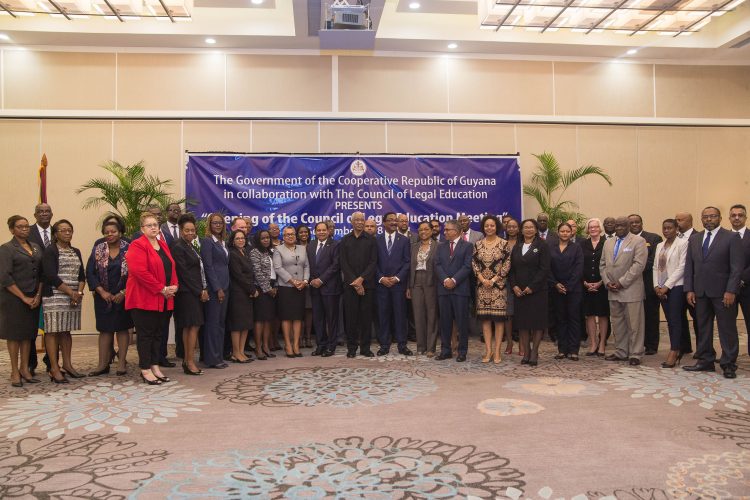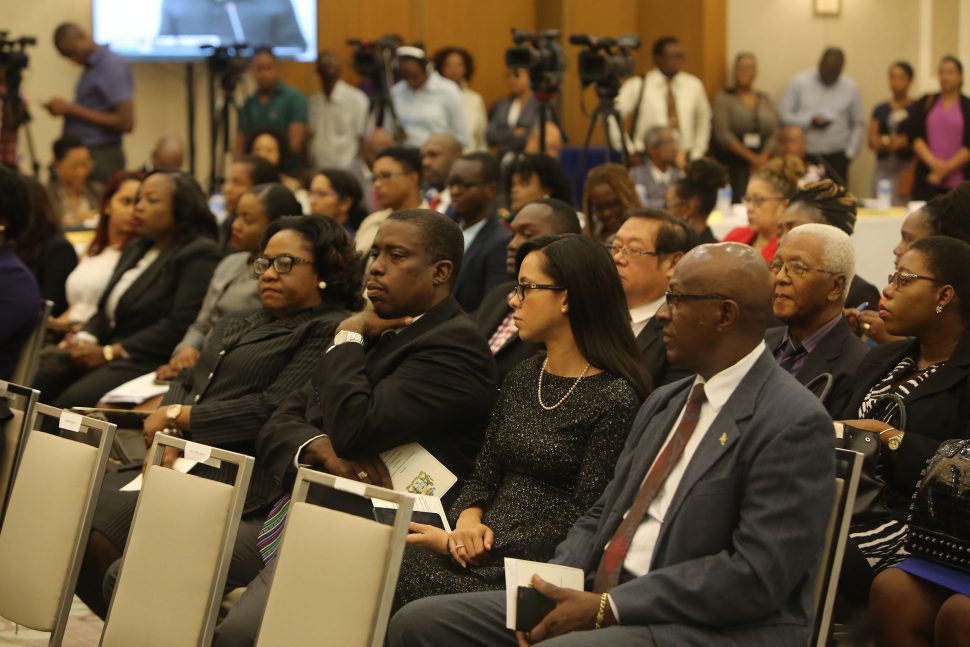Though emphasising that the number of places available to Guyanese at the Hugh Wooding Law School is inadequate, President David Granger yesterday stopped short of calling on the Council of Legal Education (CLE) to grant Guyana permission to establish its own school.
“Guyana’s need for a greater number of legal practitioners cannot be satisfied by the present quotas imposed on our students at regional law schools. Guyana looks forward to the Council of Legal Education to facilitate the education of more specialised legal practitioners in the Caribbean and in Guyana itself,” Granger said during his feature address at the opening ceremony of the 50th Meeting of the CLE at the Guyana Marriott Hotel. The meeting ends today.
Over the last three years, Guyana has moved to establish its own law school and has contended that it had permission to do so from the CLE, which is responsible for legal education in the region. The CLE has denied that Guyana had any such permission and Georgetown recently submitted a feasibility study on the proposed school, which could aid in a decision by the regional body. Without CLE approval, the graduates of a Guyana school would not be recognised in the rest of the Caribbean.

Granger told those present that given the Council’s undisputed contributions to the development of Caribbean jurisprudence, it needs to find new ways of improving access to, and the delivery of, affordable legal education to “all corners of our Caribbean.”
“So, there is much work to do, for the Council to improve access to all corners of the Caribbean. These measures should include, if necessary, embracing new technologies which support their objectives. They should ensure, also, that non-discriminatory admissions to the regional law schools are made available,” he stressed.
At the moment there are three law schools in the region – Hugh Wooding, which is located in Trinidad, Norman Manley, which is in Jamaica and Eugene Dupuch in The Bahamas. Due to zoning, Guyanese students are accommodated at the Trinidad institution, which only accepts a maximum of 25 persons on an annual basis. For over two decades, Guyana has argued that this number is inadequate and that the cost of studying and living in Trinidad is very high.
The president in his address noted that the CLE plays as essential role in legal education programmes and added that this should be aimed at producing attorneys of integrity, intelligence and impartiality. These programmes, he said, should inculcate the virtues of public service and the values of social responsibility.
“Legal education should satisfy the need for qualified and competent legal practitioners to meet the demands of changing societies,” he said. He pointed out that legal education is needed to ensure an adequate number of professionals to provide services throughout the state and promote access to justice.
“My country, Guyana, more than any other Caribbean country, needs to reduce the impact of the geographical impediments to access to justice. Guyana is the largest state in the Caribbean Community and cannot ignore the spatial dimension of extending the reach of legal services and of expanding access to justice,” he said. In this regard, he said legal aid programmes are being introduced to communities previously underserved by legal services.
“Legal aid services will become regionalised,” he assured before adding that the support for the Criminal Justice System Programme will soon facilitate the provision of legal aid services to many of the hinterland communities.
Access to the courts is being enhanced with the establishment of new magisterial districts and specialised courts. Two commissioning of the Upper Demerara River Magisterial District Court and the Rupununi Magisterial District Court over the past year were noted.
The establishment of these districts, he said, removes or reduces the need for residents to travel outside of their home regions to access legal services. Additionally, the judiciary has announced plans to establish municipal and children/youth courts, while a family court is functioning and started to hear cases since May 6th, 2016.
Great need
Meanwhile, Attorney General (AG) Basil Williams, in his remarks, pointed to the need for more Guyanese lawyers, particularly in light of the likely social and economic transformation from the oil and gas sector and the green state plans.
“Considering these new changes, it is imperative that legal education keep pace with the evolving times. If not, the profession’s ability to meet the new demands of society will be hampered. It is these changes that have stirred up the strong desire in our young people to become a part of the legal profession. Today, more persons are enrolling in law school than ever before. More Guyanese, especially considering our changing economic times, are pursuing studies in law. Our citizens want to be active participants of and beneficiaries in the development of their country and the region,” he said, while stressing that persons must not be discouraged from pursuing a legal career.
Williams, who has clashed with CLE officials over permission for a Guyana law school, used the opportunity to remind all that Guyanese cannot afford to study in Trinidad because of the high costs.
“Every year Guyanese law students are facing an enormous financial burden with fees of $98,000 TT. Our students simply cannot afford this high cost and therefore are deterred from a legal career. As Attorney General and Minister of Legal Affairs, I have received many calls and visits from students who have excelled at the undergraduate level but because of cost cannot complete their legal education”, he said in making a case for Guyanese students to be given an alternative, a school right here.
He said that to help these finance-stricken students, government for the past two years has covered 25% of their tuition cost but for the remainder it is still “a hurdle for many to jump over.”
Williams stressed that the quota for Guyana “is no longer practical” since more persons are pursuing legal studies.
He used the occasion to make mention of two recommendations in the Final Report on the Survey of Legal Education in CARICOM States (February, 2018), which was prepared by IMPACT Justice with funding from the Government of Canada.
One recommendation states that “New law schools should be set up as soon as possible as part of Utech in Jamaica, UG in Guyana and possibly in Antigua and Barbuda, principally, but not exclusively, for the non-UWI LL.B. degree graduates whose degrees are deemed by the Council to meet the equivalency standard of the UWI LL.B. degree.” The second states, “Also, as soon as possible, the CLE should commence planning to assume the role and functions of regulator, licensor and accreditation body of regional law school providers, existing and prospective, following the Kenya and New Zealand models.”
According to Williams, consideration and implementation of these recommendations would address equal access to legal education and entry into the legal profession in the region. He stressed that he is very concerned about the state of legal education here and said that the CLE needs to rise above a changing society.
“There is a wind of change blowing through the legal profession and the CLE must rise to meet the demands and challenges that come with such change… The challenge then for legal education is one of helping tomorrow’s lawyers meet the needs of that future,” he said.
Meanwhile, Chancellor of the Judiciary (ag) Yonette Cummings-Edwards, after giving a brief outline of the history and functions of the Council, noted that it is faced with challenges which are related to resources, infrastructure, increased demand for places in law schools and the changing and complex legal landscape, among others. She said one must recognise that the quality of legal education must not be “diminished or diluted.”
This is the fifth meeting being held in Guyana since 1994. Among the participants are heads of the Judiciaries, AGs and Heads of Bar Associations of Caricom Countries along with the Principals of the three Law Schools and CLE Chairman Reginald Armour SC.









